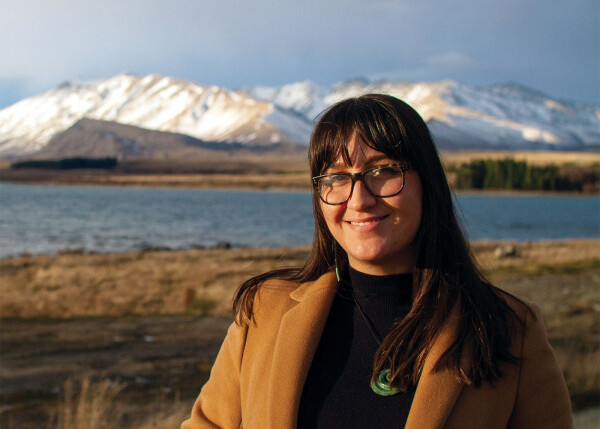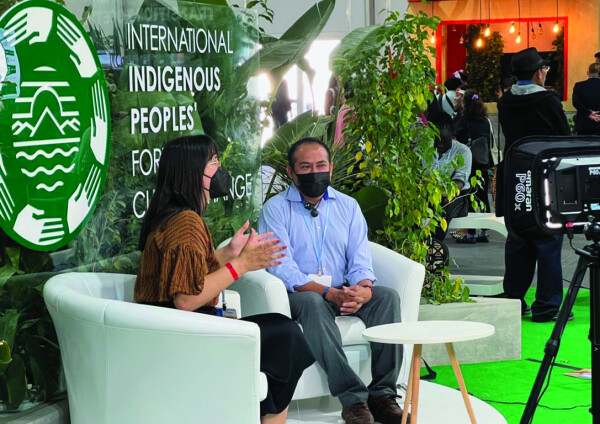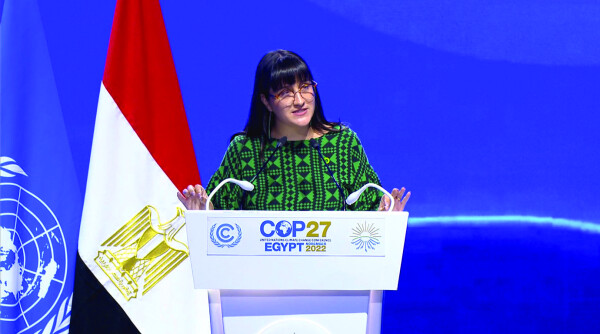Weaving Solutions
Mar 20, 2024

Kāi Tahu Collaboration in the Face of Climate Complexity
There is no doubt climate change is the biggest challenge of this generation.
As a young and growing population, our whānau Kāi Tahu of the future are going to face the consequences of our climate action or lack of it today.
Kera Sherwood-O’Regan is a climate activist and social impact strategist and has just been named in the BBC’s 2023 list of 100 inspiring and influential women from around the world.
She talks to social innovator and futures practitioner Alice Dimond about her work and how the connection between systems theory, climate activism and indigenous sovereignty could be a tool for change.

Kera at Takapō, Matariki 2022.
Alice Dimond (AD): Let’s start off by talking about COP. I know you have attended a few times and have been part of the Indigenous Peoples’ Caucus. How did you get involved and what’s it like working with other indigenous people to address climate change?
Kera Sherwood-O’Regan (KSOR): I’ve been involved in climate action since I was really young. I was really into it in school and was in environmental clubs, youth groups, that sort of thing. That was back in the early 2000s before things like School Strike for Climate, so it was still a little bit nerdy and niche.
In my seventh form I was part of the Youth Delegation for the COP15 climate negotiations in Copenhagen in 2009. For that delegation I was the one who stayed home and coordinated the engagements with rakatahi here in Aotearoa, but that’s when I first got exposed to how the UN system works. I was in and out, and on the fringes of the movement for quite a while and then, in 2017, I joined a delegation attending COP23 in Bonn, Germany.

An interview in the indigenous Peoples' Pavilion at COP27, Egypt.
The Indigenous Peoples’ Caucus is the group of all different Indigenous Peoples’ organisations and groups who are in attendance at the COPs. Because the United Nations Framework Convention on Climate Change is all driven by state (government) parties, and our sovereignty is not recognised, we’re essentially there trying to lobby parties and their negotiators to do the right thing on our behalf. I’ve built lots of great relationships and have learnt a tonne about how the legal process there works – but also how as Indigenous Peoples we can collectively build power and influence change. Even if we don’t directly have a seat at the table within that system, and our sovereignty as Indigenous Peoples and nations is not recognised, there are still ways we can influence that system especially when we are able to collaborate. Our experiences day-to-day might be different, but we’re all sort of facing the same thing, or just combating a different face of the same system of oppression.
AD: That’s really cool, and I bet there are things you will have noticed in that setting about the unique relationship we, as indigenous people, have with the environment. What have you learned about how Māori and other iwi taketake relate and connect to environment, compared
to non-indigenous?
KSOR: I personally think the mainstream conceptualisation and framing of climate change overall is really problematic, which makes it challenging for people and communities to act in a way that will get the outcomes we actually want. This isn’t to generalise or romanticise indigeneity in any way, but I often find that when engaging with other iwi taketake and Māori there is a fundamental focus on relationship; so recognising that climate change is a symptom of the fact that we
(as a society) are not in a good relationship with Papatūānuku right now.
And I think as Indigenous Peoples there is an inherent recognition that we have a responsibility to remedy that relationship because we’ve learnt what happens when we live out of step. This thinking comes from our ways of being, mātauraka, traditions, and histories – we have generations of knowledge and stories to draw on to understand the need to restore balance.
AD: That’s a good point and to me that lack of balance speaks to how other social systems and mindsets, power structures and values are all woven together to create this pattern of imbalance. So, to create a new system where we live in balance with the taiao we need to re-weave the whole pattern, rather than view climate change in isolation. What are your thoughts?
KSOR: I think about climate change as being like a tabletop, and that all these other systems of oppression are the table legs propping climate change up – so that is colonialism, extractivism, capitalism, ableism, racism, sexism – they all support each other. Colonialism is informed by and receives support from capitalism, and vice versa. What makes people go from one side of the world and makes them want to travel to the other side to colonise an indigenous people, right? It’s driven out of what is happening in that society, an inequitable distribution of resources there, or a drive for power.
The process of colonisation itself produces climate change – it’s extremely carbon intensive to colonise a people and whenua, and to maintain that colonial structure in an ecosystem where it’s completely unfit for purpose. So, I think about climate change in that way, that these systems are all producing and upholding climate change. I think what’s important is that rather than only focusing on that tabletop, being climate change, that we target the legs to destabilise the tabletop.
AD: Totally agree. There is a saying that knowledge doesn’t create change, what people do with that knowledge does, which makes me think about how we all have this knowledge about the pressing challenge of climate change, but it is harder to turn that knowledge into action. Why do you think it’s so hard to turn aspiration into action?
KSOR: Personally, I think one of the big problems is that there isn’t actually agreement on what the knowledge is that needs to be known. I think a lot of people talk about needing to understand climate change in scientific terms, but to be honest despite having spent a lot of my life being very invested in that idea, I don’t think understanding the science is actually the problem. I think there’s a base level that’s required but we’ve got enough information now to say that these human activities are causing climate change, and this is the mechanism by which it happens.
What I think is missing is that understanding of the connection between different systemic issues, of which climate change is one, and that failure to see that connection prevents real climate action playing out. So, we think, ‘Oh well we have introduced this policy and carbon taxes and electric vehicles, but why isn’t it making a dent?’ And that’s because we’re not tackling the underlying systems.
I think it’s the Western mainstream who have been failing to see that connection for so long and it stops us from embracing community-driven approaches and indigenous ways of knowing. The mainstream still sees climate change in this reductive scientific framing that looks at it like a mathematical equation rather than a whole system of systems, and a human issue that unfairly impacts indigenous people. They don’t see that when Indigenous Peoples are saying “Land Back”, that’s a climate issue and climate action.
So, we need the mainstream to start listening to us and learning, instead of constantly forcing us to use all our energy trying to rationalise, or prove, or quantify scientifically, that our knowledge or our ways of knowing have any value.

Kera presenting at COP27 in Egypt where she was part of a team advocating for disability rights.
AD: There is a huge opportunity there because as our world becomes increasingly volatile and unpredictable, we will no longer be working within well-defined parameters. We will need to be values and vision-driven, rather than focused on pre-determined outcomes. We can show that collaboration based on shared values can create climate justice; our history and stories prove that we can work together to solve challenges by trusting in our own values and knowledge systems.
KSOR: Yeah, we do need to act differently and do things that are new compared to what the mainstream is doing. But I think what might be relatively new now is actually returning to older practices and retooling them for the new environment we’re in. Like when you focus on the Māori value of interconnectedness, you start to notice things differently and then you start to act accordingly because you’re acting through that lens of being in relation with the whenua that you’re on, rather than being the consumer of the natural resources or the consumer that’s extracting from the environment. Take, for example, how we as Māori mihi to our natural environment when introducing ourselves. By acknowledging the mauka, awa and moana that surround us we are acknowledging the connection and need for balance between us and the taiao.
I think if there is an over-reliance on newness it actually reinforces the same system that got us here in the first place. Newness is the driving force of consumerism and unsustainable growth. Instead, we need to look backwards and think what has happened previously and how can I understand and retool that – even if it is challenging, even if it is time consuming, even if it’s harder to measure and harder to package into a fundable project.
AD: Would you say that the grand challenge for us is therefore our ability to deal with this level of complexity and to connect the multiplicity of changes to create a new pattern of positive climate action? No single entity will be able to do the work, so we need to embrace sharing lessons and knowledge between ourselves.
KSOR: Yep, absolutely there is a need for cross movement solidarity and a focus on the intangibles, like the quality of our relationships.
That’s our strength as Indigenous Peoples – strong relationships. Because relationships are the foundation of strong movements and collective action. We can solve this issue because we’ve solved or had experience with similar intersecting problems in the past. I think as Indigenous Peoples there is an inherent knowing that we have the solutions, and again, that’s not about romanticising it, but recognising we can draw on generations of knowledge for solving problems.